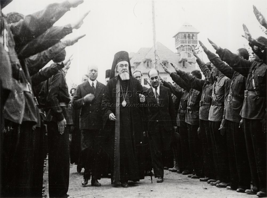Veranstaltungen
Mit seinen wissenschaftlichen Veranstaltungen versucht das Wiener Wiesenthal Institut für Holocaust-Studien (VWI) die neuesten Ergebnisse im Bereich der Holocaust-, Genozid- und Rassismusforschung einem breiteren ebenso wie einem ausgewiesenen Fachpublikum regelmäßig näher zu bringen. Die unterschiedlichen Formate dieser über einen engen Wissenschaftsbegriff hinausweisenden Veranstaltungen, die von in einem kleinen Rahmen gehaltenen gehaltenen Vorträgen, den Simon Wiesenthal Lectures über für ein Fachpublikum interessante Workshops bis zu großen internationalen Tagungen, den Simon Wiesenthal Conferences reichen, spiegeln das breite Tätigkeitsfeld des Instituts wider.
Präsentationen von ausgewählten Neuerscheinungen zu den einschlägigen Themen des Instituts, Interventionen im öffentlichen Raum, die Filmreihe VWI Visuals und die Fachkolloquien der Fellows runden die Palette der Veranstaltungen des Instituts weiter ab.
| VWI invites/goes to... | |||
| Ionuț-Florin Biliuta: Sowing the Seeds of Hate – The Antisemitism of the Orthodox Church in Interwar Romania | |||
Mittwoch, 18. März 2015, 16:00 - 17:30 Institute for Human Sciences, Spittelauer Lände 3, 1090 Vienna
|
|||
VWI goes to the IWM
Comments by Oliver Jens Schmitt
Ionuț-Florin Biliuta is currently a Junior Fellow at the VWI. He has a PhD in History from CEU (Budapest, Hungary) and is a PhD student in Theology at Babeş-Bolyai University (Cluj-Napoca, Romania). He has nu-merous publications in Romanian historical journals. Together with Nadia Al-Bagdadi and Anca Şincan, he is currently editing 'Transforming a Church. Eastern Christianity in Post-Imperial Societies' (Budapest: CEU University Press, 2014).
Univ.-Prof. Dr. Oliver Jens Schmitt is historian, Professor of Eastern European History at the University of Vienna.
In cooperation with:
|
|||






 The present project is focused on the antisemitic discourse of several prominent orthodox clergy-men and theologians associated with the Romanian Iron Guard and the radicalisation of orthodox nationalism under the impact of fascism. Under a wave of right-wing ideological radicalisation, or-thodox clergymen and theologians shifted from understanding the Jew according to the Patristic theology and Canon law to a more confessional, exclusivist trend of theology. The contributions of the Orthodox theologians and laymen to the narrative related to identity construction in post 1918 Romania led to a process of exclusion of the Jews from the midst of the nation fundamentally dif-ferent from other fascist movements, namely the exclusion on confessional grounds: if a Romanian citizen did not share the same religious confession as the majority of the population, he was deemed ethnically unfit to be a
The present project is focused on the antisemitic discourse of several prominent orthodox clergy-men and theologians associated with the Romanian Iron Guard and the radicalisation of orthodox nationalism under the impact of fascism. Under a wave of right-wing ideological radicalisation, or-thodox clergymen and theologians shifted from understanding the Jew according to the Patristic theology and Canon law to a more confessional, exclusivist trend of theology. The contributions of the Orthodox theologians and laymen to the narrative related to identity construction in post 1918 Romania led to a process of exclusion of the Jews from the midst of the nation fundamentally dif-ferent from other fascist movements, namely the exclusion on confessional grounds: if a Romanian citizen did not share the same religious confession as the majority of the population, he was deemed ethnically unfit to be a 